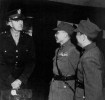Search
Using the filters to the left, click your selection, it will become bold and filter the results, click it again to remove that filter.






Reviewed by Lieutenant Colonel Duncan Foster By Charles E. Kirkpatrick, CreateSpace Independent Publishing Platform, 2015, ISBN 978-1519741837, 172pp ‘It would be difficult to exaggerate Wedemeyer’s impact as a strategic planner during 1941-1943.’ [1] D. Clayton James A staff officer’s work is by necessity unsung, however, at certain points throughout history it can be seminal. Over a three-month period before the US entered the conflict, Major Albert Wedemeyer wrote the US Army Victory Plan for the Second …

Chaplain Brenton Fry enlisted in the ARA in 1982 and enjoyed a variety of postings as a soldier before entering into the Full-Time Study Scheme as a Chaplain after 20 years’ service. He entered Chaplaincy as a Married Deacon/Catholic Chaplain. One of his significant postings was to 6 RAR, helping to settle the battalion back from operations. In 2013 he self-funded a trip to the USA to attend a seminar on ‘Soul Repair’ at Brite Divinity College, overseen by Rita Nakashima Brock and Larry Graham. On his …

MAJ Hayward is an Intelligence Corps Officer posted to the Future Land Warfare Branch at Army Headquarters. MAJ Hayward is currently researching Information Warfare and the Information Environment for the Australian Army Research Centre. … Lee Hayward …

This paper is the first in the Occasional Paper - Command and Leadership Series and is published in line with one of the Chief of Army’s primary tasks for AARC: to enhance the quality of leadership in Army. Nothing is more important to an army than the standard of its leaders. Success or failure in every military endeavour throughout history can be linked to the quality of leadership displayed, and therefore, any research which can positively impact on the quality of Australia’s future Army leadership is …

